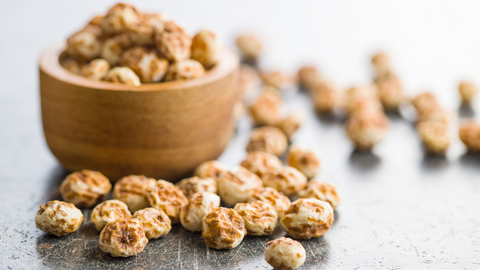If you have an autoimmune disease, you may have heard about the AIP (Autoimmune Protocol) diet. The AIP diet is designed to help reduce inflammation and promote healing in people with autoimmune diseases.
The AIP diet restricts common food allergens and inflammatory foods and encourages consuming nutrient-rich foods that may help improve symptoms. While there is no one-size-fits-all approach to the AIP diet, it may be helpful for some people with autoimmune diseases.
Consult with a registered dietitian or doctor specializing in autoimmune diseases to see if the AIP diet is right for you.
What Is the Autoimmune Protocol Diet?
The Autoimmune Protocol (AIP) is a stricter version of the Paleo diet. It's especially helpful for those suffering from autoimmune disorders like rheumatoid arthritis, lupus, and psoriasis, as well as those with chronic inflammation or gut dysbiosis (i.e., bacterial overgrowth in the small intestine).
On the AIP diet, you avoid foods that contain potential irritants to
sensitive systems: gluten, dairy, and eggs are the main ones, but there are other foods that are also eliminated for certain periods.
The AIP is an autoimmune protocol, not a specific diet plan designed to manage weight loss. However, it can be beneficial for managing inflammatory conditions like acne, eczema, psoriasis, arthritis, and allergies.
How Does the Autoimmune Protocol Diet Work?
The idea behind this diet is to avoid "tricking" the immune system with foods that may be tolerated by most people, but not everyone, or that have an exceptionally high amount of a particular polyunsaturated fat, which could irritate the gut lining in some people.
Once you've been following this diet for several months and your symptoms have significantly improved or disappeared, you can experiment with adding back some of these other healthy foods one at a time if desired.
As always, pay close attention to how you feel after including each new food to see if it's something your body does well with or
not. Fruits (excluding citrus fruits), nuts and seeds, vegetables (excluding nightshades), mushrooms, full-fat dairy products, starchy potatoes, and whole grains are all often healthy additions.
Foods To Avoid With Autoimmune Protocol Diet
Grains
Grains are off-limits on the AIP diet. Most people will report improved digestion when cutting out grains entirely. As with all foods introduced back into your diet, it's a good idea to eat them only in moderation and see how you feel afterward before adding them back in any more frequently than that.
Beans and Lentils
Like grains, beans and lentils also contain anti-nutrients such as lectins and phytates that can irritate an already-inflamed digestive tract. They also contain high amounts of fiber that can irritate some people's intestines. These are foods to avoid on AIP (particularly during elimination phase). This is more often the case with harder-to-digest varieties like black beans, red lentils, and chickpeas than white beans or split peas.However, even these milder varieties may still cause problems for those struggling with digestive issues.
Nuts
AIP requires that you eat no nuts during elimination phase. It's best to avoid nuts during the active phase of an autoimmune condition because they contain so many different proteins that can act as allergens. Over time, some people find they can reintroduce certain nuts back into their diets without experiencing any symptoms, but this varies from person to person. If you do choose to eat them at some point down the road, just be sure not to eat too many at once, and don't introduce new nuts back into your diet more often than every other day — or even better, try to do it no more than once a week.
Nightshades
The nightshade family of vegetables is believed to be harmful to the digestive tract in some people because they contain alkaloids and lectins, both of which can irritate an inflamed intestinal lining. This includes bell pepper, cayenne, chili powder, paprika, and especially tomatoes (including ketchup and tomato sauce). Eggplants are also considered part of the nightshade family - thus all should be avoided.
Foods To Eat With Autoimmune Protocol Diet
Leafy Greens
Leafy greens such as spinach and kale are superfoods! They provide a wealth of nutrients, including magnesium and vitamin B6. These two minerals have been shown to reduce pain from arthritis-related conditions by 34-40%. They're gluten-free, and green leafy vegetables can be added easily to your favorite recipes.
Coconut Oil
Coconut oil is one of the best oils you can use for cooking, as it's high in lauric acid (closely related to myristic acid). Lauric acid has been shown to help with viral infections such as herpes and influenza. It also boosts the immune system by activating white blood cells that help fight off infections or diseases. To top it all off, coconut oil has anti-inflammatory properties and antioxidant properties that protect the body from various diseases such as cancer and arthritis.
Fermented Foods
Fermented foods are full of healthy bacteria that help improve your gut health by balancing the good bacteria in your intestines. These foods are also crucial if you're suffering from any autoimmune diseases because they help restore beneficial flora to your stomach, which will make it nearly impossible for bad bacteria to thrive there. Some examples of fermented foods include sauerkraut, kimchi and kombucha (and as long as there are no added sugars or non-AIP compliant spices, these are great additions to your diet!).
Herbal Teas
Most herbal teas are gluten-free by default, so you don't have to worry about any hidden ingredients in them that might trigger a negative autoimmune reaction. They are also normally decaffeinated. Just be mindful of any added sugars in certain brands of teas.
Conclusion
If you are considering starting the autoimmune protocol diet, be sure to consult with a doctor or nutritionist first to create a plan that will work best for you. There is no one-size-fits-all approach to the AIP diet, so find what works for you and stick with it. Remember, this is not a quick fix — it takes time and patience to see results. However, if you can stick with it, the payoff can be so worth it! If you are looking for a place to buy AIP diet foods, check out your local health food store. And check out our baking mixes too! Eat G.A.N.G.S.T.E.R. offers various baking mixes for cookies, cakes, quick breads and more - and they are all elimination phase AIP compliant!



